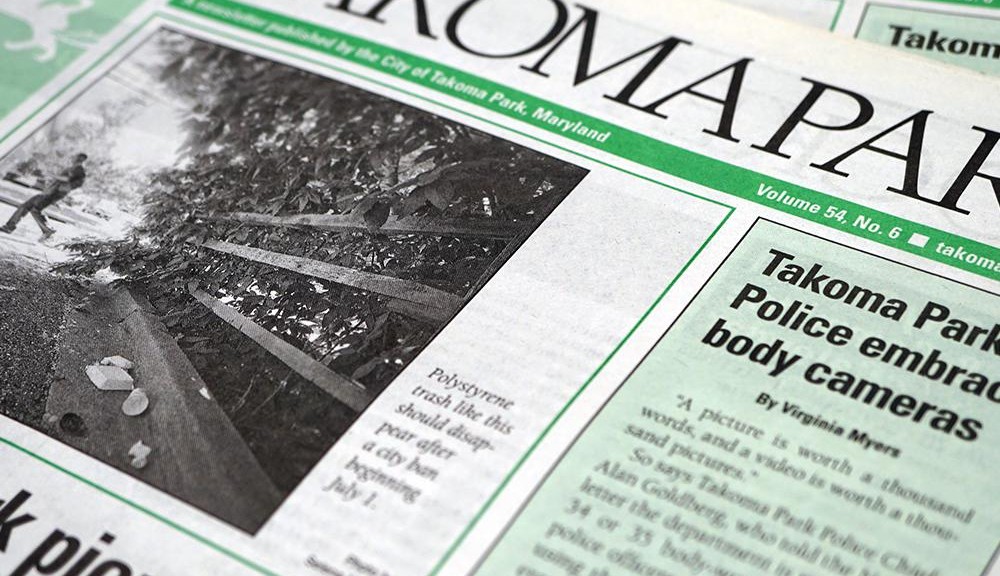By Morgan Fecto
It’s a Thursday night in early December, and although the days are darker, things are light at April Blum’s Adelphi home. That is, Contra dancers are light on their feet.
“The hall we’re usually in wasn’t available, but as it happens, I have a 25 foot by 50 foot ballroom in my house,” said Blum, who is president of the Folklore Society of Greater Washington. “We call it ‘Ballroom Blum,’ and we even have a Facebook page.”
Blum lends her home to the arts, and as a part of FSGW, she gives her time to sharing folk arts with the community. Of the 200 annual FSGW-sponsored events, the Mini Fest at Takoma Park Middle School is especially significant to those who organize it.
“It’s just an absolutely joyous way to spend a cold and grey February day — regardless of the weather, it’s warm inside,” said Blum. “My favorite is walking the hallway and hearing music coming from the stairwell or people singing acapella.”
Spontaneity and participation are cornerstones of Mini Fest’s fun. Morris Dancers break into “Morris Choruses,” Flamenco dancers and cigar box guitar makers give workshops, and singers from every folk tradition fill the middle school’s cafeteria, the craft-lined hallways, and five adjacent classrooms with a cacophony of sound.
“It’s a blast is what it is,” said Mini Fest programmer Mike Livingston. “Being able to share stuff with the community and have it be well received, that’s exhilarating.
Organizers finalize the Fest’s program schedule in midJanuary, but attendees can bank on harmony workshops, a “Jams Room,” banjo, English Country dancing, storytellers spinning tall tales, and of course, Subway sandwiches. They can also expect something new: a room dedicated to participatory programs for families with children.
“You or I, if we’re not into a performance then we can walk down the hall, but kids can’t if they’re not excited,” Livingston said. “That’s why we’re going to give them an opportunity to do something.”
Since Blum started organizing the Mini Fest with Charlie Baum in 2006, she’s wanted to expand the children’s programming at Mini Fest. The hope is that expanding the variety of workshops and demos will introduce them to a lifelong passion.
“Dancing brings us together, and children get it,” said Blum. “They see that you’re more powerful in a group, and they see those crisp moments in a group dance when everyone reaches out their hands to simultaneously make a star. Dance is ephemeral. It’s passing beauty.”
It’s that kind of zeal for the arts that keeps the all-volunteer FSGW running. “The key word in the FSGW is ‘society.’ It’s everyone stepping up to make this happen,” Livingston said.
When it comes time to schedule the Fest’s programs, stepping up kicks into high gear.
“What happens in a community like this — with talented people who are so engaged — is that many of the performers are involved with more than one thing — a musician in one group, a dancer in another, with a thing on the side,” Livingston said. “It’s about navigating schedule conflicts. Charlie does a really good job of organizing things so that people don’t have to be in three places at once.”
When past Mini Fest schedules have included 300 performers, this can be quite a juggling act. Even with such a robust program, Blum said that the Fest is always affordable. “FSGW was founded 50 years ago at the height of the folk music revival. There’s a certain philanthropic idea that making music and dance available to the community at large and paying musicians for their talents is an important thing for a society to do,” Blum said. “Our ticket prices are low so that people can afford to come.”
Experiencing art and kinship is more vital in such dark winter days, too. “When you dance down the line at Contra and someone swings you, it’s like getting a hug every time,” Blum said. “We’re primates — we need to be touched, but most of us sit at computers all day, so dancing brings us together.”
Livingston echoed Blum: “It’s also true, as Abe JoynerMeyers [of fiddle ensemble Maelstrom] has pointed out, ‘In dark or difficult times, we need to put some energy into our culture, and the arts and humanities create community and promote inclusiveness.’”
The 2017 Mini Fest is on Feb. 4 and runs from noon until 10:30 p.m. with a break from 6 – 7:30 p.m. Ticket prices range from eight dollars to 55 dollars, varying based on group size, time frame of attendance, and FSGW membership statues. To learn more about Mini Fest, visit fsgw. org. To inquire about volunteering or becoming an FSGW member, contact April Blum at president@fsgw.org.
Morgan’s resolution for the New Year is to do a cartwheel really casually, and to not make a big deal out of it. Although, she wants to know in her heart that everyone saw it — just one stunning, gorgeous cartwheel.
This article appeared in the January 2017 edition of the Takoma Park Newsletter. The Takoma Park Newsletter is available for download here.

